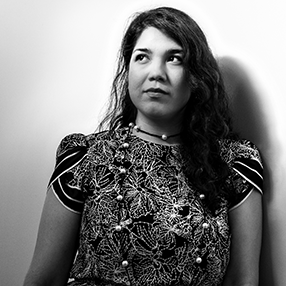Bitch Instinct
Before this day I loved like an animal loves a human, with no way to articulate how my bones felt in bed or how a telephone felt so strange in my paw. O papa— I called out to no one— but no one understood. I didn’t even. I wanted to be caught. Like let me walk beside you on my favorite leash, let my hair grow long and wild so you can comb it in the off-hours, be tender to me. Also let me eat the meals you do not finish so I can acclimate, climb into the way you claim this world. Once, I followed married men: eager for shelter, my fur curled, my lust freshly showered. I called out, Grief. They heard, Beauty. I called out, Why? They said, Because I can and will. One smile could sustain me for a week. I was that hungry. Lithe and giddy, my skin carried the ether of a so-so self-esteem. I felt fine. I was fine, but I was also looking for scraps; I wanted them all to pet me. You think because I am a woman, I cannot call myself a dog? Look at my sweet canine mind, my long, black tongue. I know what I’m doing. When you’re with the wrong person, you start barking. But with you, I am looking out this car window with a heightened sense I’ve always owned. Oh every animal knows when something is wrong. Of this sweet, tender feeling, I was wrong, and I was right, and I was wrong.
Copyright © 2018 by Analicia Sotelo. Originally published in Poem-a-Day on September 5, 2018, by the Academy of American Poets.
“In this poem, I wanted to experiment with writing a speaker who didn’t need to be seen as perfect, someone who could sustain a brutally honest admittance about the ways in which they’ve existed outside of physical relationships and still craved them. I was interested, too, in loneliness and the complicated desire for shelter in love alongside the challenge of intimacy in a society where masculinity has claimed space. Here the speaker is naming their instinct—that there is something right and not right about relationships. There are risks and comforts to that theater of intimacy. We don’t always know ourselves until we see ourselves with another person, and this poem is a reflection of that discovery.”
—Analicia Sotelo

